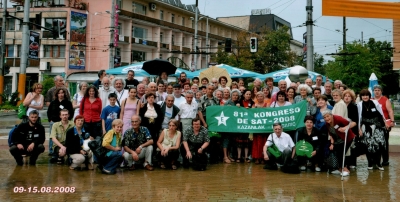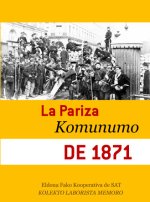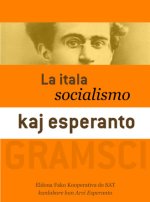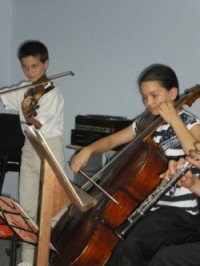
A World Conference of Workers without a Language Barrier – the 2008 SAT Congress in Kazanlak (Bulgaria)
Worldwide
Esperanto
Courses
Magazine
Texts
Links
Contact
A World Conference of Workers Gets around the Language Barrier
An 18-year-old young woman whose native language is French sits at the table with an 80-year-old anarchist whose native language is Bulgarian. As they sip coffee, he recounts his prison experiences before and during Communist rule. Out in the hallway, a 60-year-old Bulgarian woman and a 20-year-old Serb exchange information about their living conditions. During a meeting, a man from Extremadura explains to participants from different language groups that the bosses are organizing exploitation in the European Union in a way that transcends national boundaries. A comrade from Tokyo says that the Japanese Communist Party is the fourth-largest in the country and is drawing mass support from young people. Despite the wide range of political opinion and language, everybody communicates skillfully in Esperanto. This is the 81st Congress of the World Anational Association in Kazanlak, Bulgaria.

From August 9 to August 16, 2008, 80 workers from 14 countries and 3 continents came together once again to develop their organization, exchange knowledge and experience about socio-political events throughout the world, make friends and initiate new projects. The program is packed with events.

Social Forums
These forums dealt with subjects like world hunger, trade-union activity and aid to immigrants, possible solutions to the worldwide environmental and social crisis, the socio-political situation in post-socialist regions of the world and exploitation in capitalist paradise. The congress Declaration summarizes the qualities and provisional conclusions of these debates.
Development of SAT's Activities
In order to extend internal democracy and contacts with comrades who lack internet access, a network of SAT circles is being set up, i.e. groups of members in specific regions who come together to organize local contacts with other workers' organizations and to discuss the organization's internal affairs.
SAT is actively pursuing its activity against armament, calling upon states to sign the Convention of Ottawa and the future Oslo agreement.
SAT is embarking on an ambitious campaign that aims to publish informational material in a number of languages about SAT's worldwide educational role.
In keeping with its educational role, SAT has decided to organise training courses in web management and organizational finance, so that the membership can be as independent as possible inside and outside of SAT.
The publishing cooperative, having launched its activity by producing informational material, T-shirts, several brochures and its first book, Mortopuno ["The Death Penalty"], has now come out with two new books in its new collection Laborista Memoro ["Workers' Memory"].
La Pariza Komunumo de 1871 was edited in collaboration with the Friends of the Paris Commune of 1871. It presents articles about several of the Commune's active participants, along with a historical sketch of this significant episode in workers' history. La Itala Socialismo kaj Esperanto presents the debate on Esperanto that took place in the Italian socialist press in 1918 and in which Antonio Gramsci had a very influential role. The historical documentation is supplemented by three current articles that shed light on the debate from several angles. Most of the collaborators are members of the Esperanto section of the Italian socio-cultural association Arci. Three more books are in preparation and five new projects were initiated during the congress.


The Cultural Program
Several lectures were held:
- A Short History of Bulgaria and the City of Kazanlak by Svoboda Damyanova
- The Women's Movement in Bulgaria by Radka Stoyanova
- The Book "Salvo de nigra bubalo" by Laszlo Husar
- The Working Class Esperanto Writer Christo Gorov by Radka Stoyanova
- Chudomir, Bulgarian Writer and Painter by Nikolao Uzunov

As befits a workers' organization, the program was rich in presentations of folk culture:
- folk dances and songs presented by local folk dance clubs
- a concert by Libriko, a Belgrade ensemble consisting of four young brothers and sisters, whose rendition of music from the whole world was both touching and impressive. At the end of the concert they even asked members of SAT to contribute by sending them more songs and music from their own regions. That is the kind of direct exchange in which SAT's members may engage.
Excursions
As is always the case at Esperanto congresses, the opportunity for tourism is not neglected, as local people are there to show the region to foreigners, and are the most capable interpreters. In Kazanlak, participants paid visits to museums of ethnology, the rose industry, the artist and storyteller Chudomir, the musician Petko, and to the replica of a Thracian cemetery. In the vicinity of Kazanlak they visited a real Thracian cemetery, the beautiful Russian church in Shipka, a memorial at the summit of Shipka Pass, the monastery at Drianovo and the city of Veliko Tarnovo, once the capital of Bulgaria.
And most of all, direct contacts alongside the official program
As full as the official program was, it would be wrong to treat it as if it were all there was to the congress. Contact between people occurred between meetings, during meals and for some late at night. There is no way to go into all of the extras that are the wealth of a SAT congress, and which do more to implant a worldwide class consciousness in their minds than any theoretical lecture. Just one example of many: a retired Australian plumber doubted that it was very worthwhile to go to a congress attended by many "intellectuals", teachers, engineers and the like. His neighbor at the table, a biology researcher, was easily able to find examples to show that that was an exaggerated generalization (especially as the third person at the table was an agricultural worker from the Pyrenees), based on just a few experiences at the congress. Or a discussion about corruption and racism in the trade-union milieu with a former diamond cutter. Or the remark made by one of the organizers of the congress, a worker at an arms factory, during a walk. He noted that non-reimbursement of medical costs by the health insurance system has become the fashion in Bulgaria too.
Naturally, discussions are not always that serious. To judge from the spontaneity of the laughter, the play on words made by a Croatian woman comes over well to her neighbors, whose native languages are French or Dutch.

It is also worth mentioning that some exchanges took place in English too. One time that happened was when two women from the Bulgarian communist party came for a visit. It was quite different, for a change, to stammer in hesitant English during conversations out in the hallway, and to confer during the meeting through the medium of a Bulgarian Esperantist interpreter. That didn't keep other multilingual participants from taking advantage of the occasion to refresh their knowledge of Bulgarian. Esperanto is a very practical solution to the problem of worldwide communication, but by no means the only one or in some way compulsory.
Declaration of the 2008 SAT Congress
The 81st Congress of SAT in Kazanlak (Bulgaria), which convened from the 9th to the 16th of August 2008,
- requests in a letter to the ambassadors of China, Finland, India, Israel, Russia and the United States to Bulgaria that they call upon their respective governments to sign quickly the Ottawa Convention, which bans the use and manufacture of anti-personnel mines,
- notes
- that illegalisation, detention at the border and administrative imprisonment of immigrants, such as they occur throughout the world, violate human rights to free movement and decent living conditions,
- that economic, military, climate change and other pressures that cause involuntary emigration need to be eliminated,
- and commits itself to combat such injustices on the part of governments, - notes that problems of Earth governance and socio-political problems are inseparable and that their solution requires a dialectical synthesis between ecologism and socialism,
- notes that the present hunger crisis, just like problems of global governance and socio-political problems, cannot be solved through begging and through humanitarian and benevolent activities, but rather by providing horizontal direct mutual aid and by exchanging experiences and ways and means: SAT is one instrument of such mutual relations,
- encourages workers in post-socialist and other areas of the world to hold their heads up and organise on a worldwide scale to combat the capitalist system that continues to oppress them.
